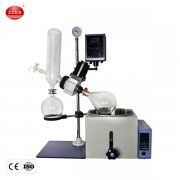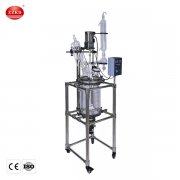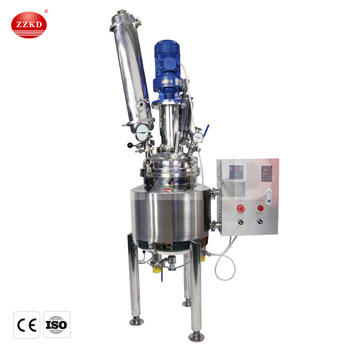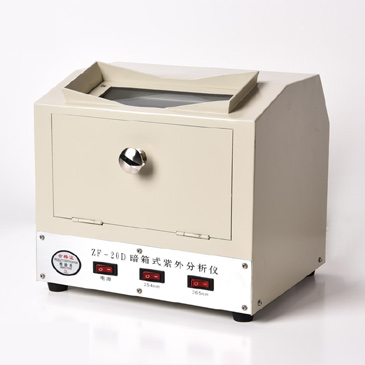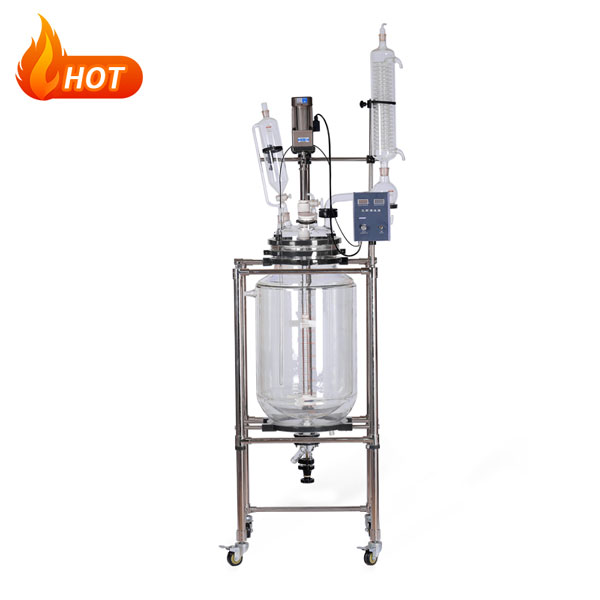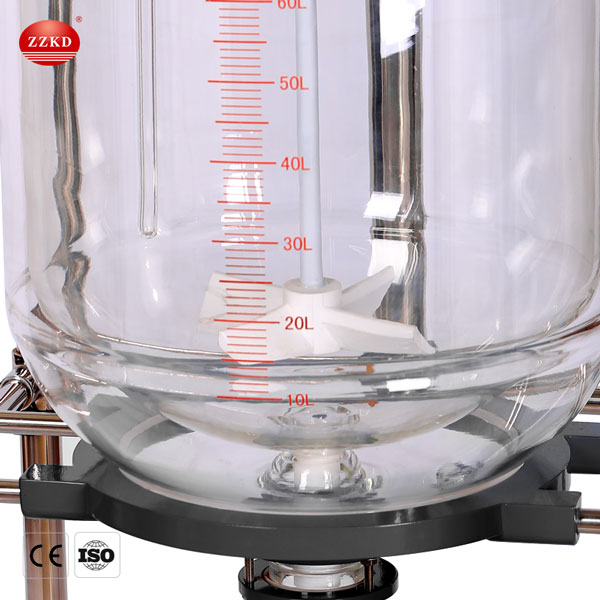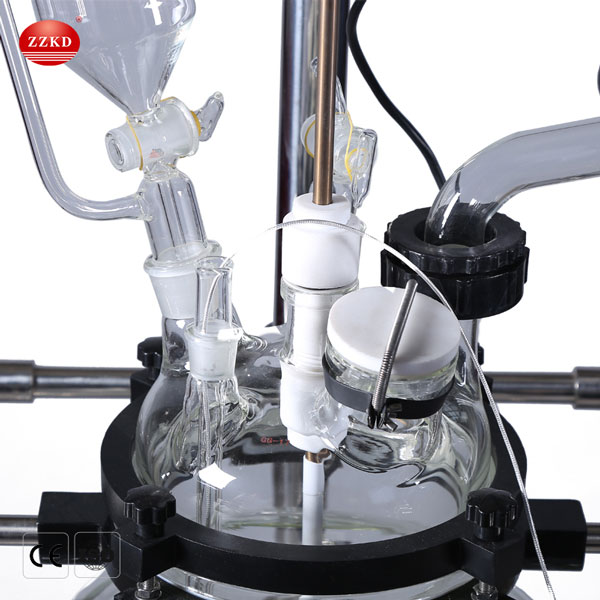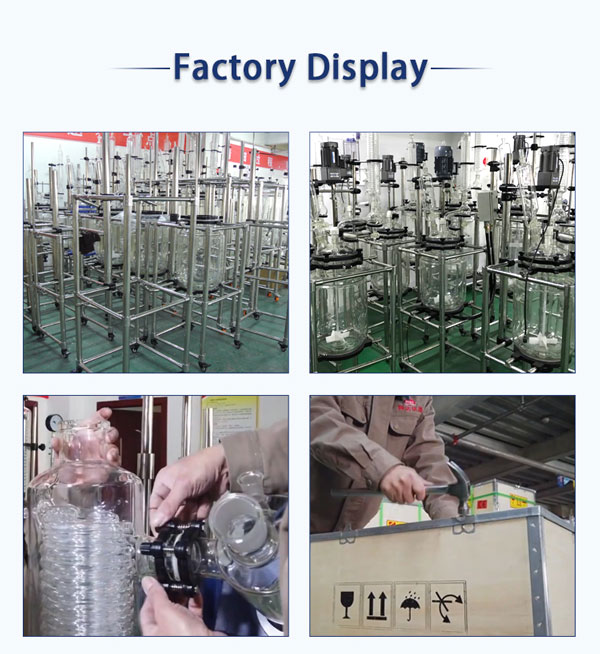The 100 Liter
double jacketed glass reactor is a laboratory equipment used in the field of chemistry for various chemical reactions. It is commonly used in the synthesis of organic compounds, as well as in various biological reactions. This type of reactor is made of glass, making it easy to observe the reactions taking place inside the vessel.
The 100 liter glass reactor is a popular choice for laboratories due to its large capacity and ability to handle a wide variety of reactions. It is typically used for reactions that require longer reaction times or larger batches of product. In this article, we will explore the characteristics and applications of the 100 liter glass reactor.
Features of 100 Liter Glass Reactor
High capacity
The 100 liter glass reactor has several features that make it a popular choice for laboratories. One of its main features is its large capacity. This allows larger volumes of reactants to be processed, increasing productivity and efficiency. The large capacity of the 100 Liter glass reactor also makes it suitable for reactions requiring longer reaction times.
Preservative
Another feature of the 100 liter glass reactor is its glass construction. The glass used to build reactors is usually borosilicate glass, which is highly resistant to heat and chemicals. This makes the reactor suitable for a wide range of chemical reactions, including those involving corrosive chemicals or high temperatures.
Easy to operate
The 100 L glass reactor is also equipped with various accessories for easy operation and monitoring of the reaction. These accessories include a temperature sensor, a pressure gauge and a stirring mechanism. Temperature sensors allow monitoring and control of the reaction temperature, while pressure gauges are used to monitor the pressure within the reactor. The stirring mechanism ensures that the reactants are thoroughly mixed, which is critical for a successful reaction.
Multifunction
The 100 L glass reactor has many features that make it an invaluable tool in R&D and industrial production. These capabilities include:
Temperature control: The 100 Liter glass reactor is equipped with a temperature control system, which can precisely control the reaction temperature. This is important in many applications because reactions may require specific temperatures to function properly.
Vacuum and Pressure Capabilities:
The 100 liter glass reactor can be operated under vacuum or pressure, depending on the requirements of the reaction. This is important in many applications because it removes air or other gases that might interfere with the reaction, or adds gases that the reaction may require.
Easy to clean and sanitize:
The glass construction of the reactor makes it easy to clean and disinfect. This is important in many applications because it ensures that the reactor is free of contaminants that could interfere with the reaction.
Application of 100 liter glass reactor
Organic Synthesis
Organic synthesis is the process of producing new organic compounds through chemical reactions. The 100 L glass reactor has become a popular tool in organic synthesis due to its large capacity and glass construction, allowing for easy observation of reactions.
One of the applications of the 100 liter glass reactor in organic synthesis is pharmaceuticals. Pharmaceutical companies use reactors to synthesize new drug compounds, optimize reaction conditions, and scale up production of drugs for clinical trials and commercial use.
The 100 liter glass reactor is also used for the production of specialty chemicals such as polymers and surfactants. Polymers are large molecules made of repeating units and are used in a variety of applications including plastics, adhesives and coatings. Surfactants are molecules that lower the surface tension of liquids and are used in products such as detergents and emulsifiers.
Fermentation
Fermentation is the process of converting organic matter into alcohol or organic acids through the action of microorganisms such as yeast or bacteria. The 100 liter glass reactor is an invaluable tool in fermentation as it enables control of reaction conditions such as temperature and agitation and is easy to clean and sterilize.
One of the applications of the 100 liter glass reactor in fermentation is the production of biofuels such as ethanol and biodiesel. These fuels are made from organic materials, such as corn, sugar cane or algae, which are fermented to produce alcohol or organic acids, which can be further processed into fuel.
The 100 liter glass reactor is also used in the production of food and beverages such as beer, wine and yoghurt. These products are made by fermenting organic materials such as grains, fruit or milk, using microorganisms to convert sugars into alcohol or organic acids.
Cell culture
Cell culture is the process of growing and maintaining cells in vitro or outside their natural environment. The 100 L glass reactor is a useful tool for cell culture due to its large capacity and ability to control reaction conditions such as temperature and nutrient availability.
One application of the 100 L glass reactor in cell culture is the production of therapeutic proteins such as monoclonal antibodies. These proteins, used to treat various diseases, such as cancer and autoimmune diseases, are produced by genetically engineered cells grown in reactors.
The 100 Liter glass reactors are also used for vaccine production. Vaccines are made by growing viruses or bacteria in cell culture and then inactivating or weakening the pathogens to make safe and effective vaccines. 100 liter glass reactor for initial growth and propagation of viruses or bacteria before further processing for vaccine production.
The 100 Liter Glass Reactor is a versatile and versatile piece of laboratory equipment in the chemical field. Its large capacity and glass structure make it suitable for a wide range of reactions, including organic synthesis, fermentation, and cell culture. While it has some disadvantages such as fragility and high cost, the advantages of the 100L glass reactor, such as ease of observing reactions and ease of cleaning and maintenance, make it a popular choice for laboratories and research institutions. With proper maintenance and safety considerations, a 100 liter glass reactor can be an invaluable tool in chemical research and production.

 Products
Products





